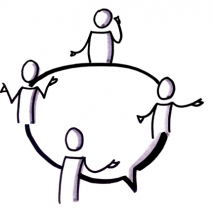By Rainer v. Leoprechting and Naomi Raja Boean for Enlivening Edge Magazine

Self-management relies on the principle that once a role is entrusted to a person or a group, those people have the authority to act within the scope of their role to pursue the purpose of that role. There is a correlating constraint that each time they might interfere with other roles or domains, they seek advice rather than just acting.
The process used to ask for advice is called “the advice process.” It’s one of the cornerstones of any self-managed organization, and can be run in many ways. As Frederic Laloux quotes Dennis Backe from AES*, there are numerous benefits to the application of the advice process, for example, “It creates community, humility, learning, better decisions, and fun.”
We at pro-action learning experience great value and benefit from running our company’s advice process using Action Learning as a template. You might also.
Before we describe the benefits, we would like you to understand the practice! To run the advice process with an Action Learning template, just a few special arrangements are needed.
· You have a person to facilitate the Action Learning session as an Action Learning coach.
· You have a person to serve as the “issue-presenter” from the role that seeks for advice. The issue itself should be urgent, and the matter complex.
· You complete the group with 4 to 8 further participants to represent other roles concerned or any other role in your organization. The latter, un-concerned roles, are invited to bring in their questions.
An Action Learning meeting takes up to 1.5 hours. In that time, the presented issue is being questioned. The conversation in Action Learning has a special rule, that questions are preceding answers. Thus insights and statements can be made only in answer to a question asked in advance.
As a result, people are asking many more questions than in other meeting formats. Questions in turn enable us to surface implicitly-held assumptions and beliefs, to open our minds to new solutions, and to help us building a common ground, in that we all become aware that we don’t know so many things.
The Action Learning coach facilitates the learning of the group with interventions that help the participants become aware of their ways of working on the topic, and raises the level of quality of the conversation. One or several scribes note the results of the process, including powerful questions, underlying assumptions, and the big picture the session has generated.
Upgrade relationship
The Action Learning template allows us to take the issue away from the original issue-holder and to place it in the center of the conversation. This allows the group to commonly address the issue in a very direct manner taking various angles and perspectives respecting the complexity of the issue. It also means the group supports the issue-presenter by holding the pressure of the issue together.
Upgrade Learning
With the Action Learning template, learning not only comes from people who have experience in the matter but also from completely uninformed people. Having this mix of informed and fresh participants allows simple, powerful questions to be asked to bring out the full wisdom and experience of the group.
People learn and practice how to enhance the quality of conversation through asking questions, to come to the point of the matter and crack the issue.
Upgrade Better Decisions
The principles of questions preceding answers and the invitation of at least one uninformed fresh participant enables us in surfacing assumptions and beliefs, and in opening our minds to new solutions. Furthermore, the interventions and coaching of the Action Learning template allows the group to come to the real issue very fast and in greater depth than without facilitation.
Upgrade Fun
Through the interventions of the coach, the group becomes aware of helpful and hindering conversation-patterns in their ongoing advice process. With the interventions, the positive patterns become reinforced, which greatly increases the quality of the conversations, releasing energy and joy.
Like any process, it gets better through practicing. The learning curve in Action Learning is rather steep. Participants observe themselves how much more they begin to ask questions instead of immediately sharing known solutions, how their quality of listening increases, and how their awareness of assumptions is energized.
Action Learning has been practiced since the 1940’s in live meetings. We practice it in online meetings so that teams or diverse groups can meet from anywhere.
If you are interested in joining a session, please contact [email protected].
*Frederic Laloux, Reinventing Organizations, page 101.

Naomi Raja Boean is fascinated by next-stage organisation practices and sustainability. After completing her Masters she joined pro-action learning ltd to support hosting and moderating (online) engagements for enlivening practices. She loves to energize and engage meaningful conversations and introducing the “Buurtzorg” concept for Health Care in Germany, which is her current home base. E-Mail [email protected]

Rainer von Leoprechting (*1965) lives on a community farm in the South-East of Austria. He is a consultant, community builder, and entrepreneur. Before this, from 1994 til 2012 he worked from within the European Commission, where he built a community of internal change agents, started and led the in-house consulting team, and introduced many innovative practices especially around how people meet and make meaning with each other. Email [email protected].





Great article! Would you provide some links and recommendations for resources on Action Learning templates?
Dear Robert Mellinger,
Thank you for reading the article and leaving your comment and question!
In terms of timing and harvesting you can have a look at the following template and feel free to use and improve it: https://docs.google.com/document/d/19A-7UUNrNJ_xcUtDBWVGSyOAh3z4aO1fmxNpwDeujDs/edit
On the method I would recommend the following video from Michael Marquardt https://www.youtube.com/watch?v=z4GMaUInMfw
Warm regards,
Naomi
The learning curve is steep? Meaning it is hard to learn and takes a long time to get good at?
Dear Tim Bailen,
Thanks for leaving your questions!
The learning curve I have observed from taking part was that a group new to the method quickly adapts to the style and method of conversation. An important element influencing the quality of the experience and learning, is when the person in the coaching role knows the method and has coached a group before. I also noticed that the quality of the questions asked rises over time, when the the group has practised together a couple of times. This happened quiet fast, say after 2, 3 conversations in action learning mode the quality of questions and listening has changed in the group.
I hope this answers your question, let me know if you have more?
Kindly,
Naomi